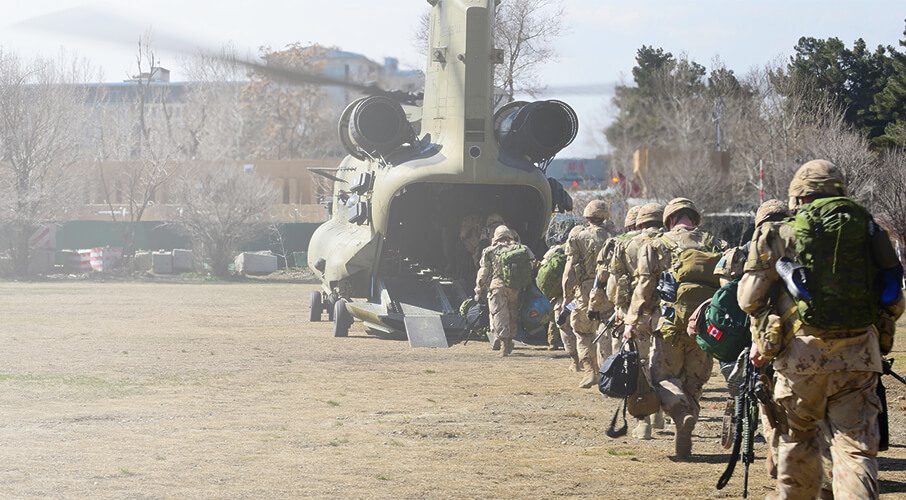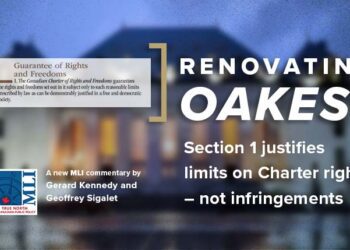
The new tragedy now engulfing Afghanistan will require a massive humanitarian and refugee response. Above all, it requires a new strategy for Pakistan, writes Chris Alexander in the Globe and Mail.
By Chris Alexander, August 20, 2021
After 20 years in Pakistan, the Taliban have retaken Kabul.
The Gulkhana palace, where former Afghan king Zahir Shah and presidents Hamid Karzai and Ashraf Ghani received dignitaries after 2001, is now filled with hard men in black turbans.
A photo of Mr. Ghani’s old desk – once cluttered with World Bank reports or draft decrees on irrigation – shows it holding a single Kalashnikov, as if to symbolize the Taliban’s new agenda. Abdul Ghani Baradar, a UN-listed terrorist who led the fight against Canada’s battle group in Kandahar, is touted to become the illegitimate “president.”
On the Arg palace’s clock tower, a white-and-black Taliban banner waves where Afghanistan’s red-black-and-green one had been – as if to illustrate the erasure of an era of colour, and the drawing of a new darkness. For Americans, it would be as if the Jolly Roger was fluttering over the White House.
For those who served and suffered over the past 20 years, this parade of misogyny, impunity and utter cruelty has been horrific, unreal and bitingly painful. Recriminations have begun; some already say U.S. President Joe Biden’s abandonment of Afghans will hang over his presidency like a pall of gun smoke, or that he was wrong to withdraw forces, or sending them at all was futile. Others suggest Afghans refused to fight, or that foreigners fuelled corruption.
My take is that our strategy went off course earlier. At the 2010 London conference on Afghanistan hosted by Britain’s Gordon Brown, everyone pledged to work “actively for Afghan-led peace, reintegration and reconciliation efforts.” Talks with the Taliban quickly became the great prize.
When Osama bin Laden was living in the heart of one of Pakistan’s garrison cities, no state suggested breaking off these negotiations. Former U.S. president Donald Trump even wanted to bring the Taliban to Camp David.
To Afghans, this need to do a deal with terrorists looked desperate; they were confused, demoralized and divided long before the Feb. 29, 2020, U.S.-Taliban agreement for bringing peace to Afghanistan cut their Afghan government out of the equation altogether. After all, when your top donor frees 5,000 hostile terrorists and does a non-aggression pact with your enemies, would you fight?
So when Mr. Biden pulled the plug, it was just the coup de grâce.
Even so, Afghan special forces clobbered Taliban elite units in Lashkar Gah and elsewhere in July. But without a backbone of American support, Kabul could not sustain the fight. The promise of power-sharing with guarantees became a full Taliban victory.
Why did talks fail? Because the U.S. ignored Pakistani goals hiding in plain sight.
In August, 2011, three months after Mr. bin Laden’s death, Mirza Aslam Beg, former army chief and ideological godfather of Pakistan’s proxy war in Afghanistan, wrote in the pages of a major Pakistani daily that “The occupation of Afghanistan is the mother of all evil.”
In March of this year, a few months after then-U.S. secretary of state Mike Pompeo met the Taliban, Mr. Beg wrote: “Taliban were cheated in 1990. They won’t be cheated again. Rather, they are the ones who will lay down the conditions for peace in Afghanistan.”
He continued: “All eyes are now focused on May 1, 2021, when foreign troops are to leave, and if they do not, the Taliban will sweep across the country to establish their writ over territory which they already control, pushing the Afghanistan government to the besieged cities and towns, which will also fall to the Taliban.”
This is almost exactly what has happened.
Making the Taliban (and their prototypes) masters of Kabul is Mr. Beg’s lifelong goal. His successors as Pakistan’s top general after the attacks on Sept. 11 have not deviated from it. Two of them even held major commands in Abbottabad when Mr. bin Laden was living there.
For Pakistan’s military, support for the Taliban has not been a sideshow, but the main act. And by ignoring this reality, U.S. leaders have been perversely backing both sides. Pakistan’s misguided strategy has also been self-defeating, as the country slides closer to bankruptcy and pariah status. The bottom line is that Mr. Beg’s “forever war” should have been stopped long ago.
When I left Afghanistan in 2009, I wrongly held out hope U.S. policy makers were waking up.
The new tragedy now engulfing Afghanistan will require a massive humanitarian and refugee response, renewed vigilance against terrorist threats and isolation of Mr. Baradar and other thugs.
Above all, it requires a new strategy for Pakistan – one that starts with sanctions.
Chris Alexander was Canada’s ambassador to Afghanistan, UN deputy special representative of the secretary-general for Afghanistan, and federal minister of citizenship and immigration. He is the author of an MLI paper titled “Ending Pakistan’s Proxy War in Afghanistan.”




